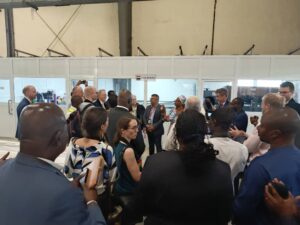By Juliet ETEFE
A six-member delegation from the German Federal Parliament, during their working visit to Ghana, inspected some projects funded by the Federal Ministry for Economic Cooperation and Development (BMZ).
Dr. Christoph Hoffman, acting chairperson-Committee on Economic Cooperation and Development, explained that the MPs are Committee members representing different parties and travelling to various countries in which Germany has bilateral cooperation.
He noted that the visit to Ghana, among other things, seeks to ensure that German taxpayers’ money is invested effectively and aligns with objectives of the Ghanaian government and its people.
Dr. Hoffman also emphasised the importance of financial cooperation in the current phase of Germany’s support: “Initially, technical cooperation was crucial; but as education standards have improved, the focus is shifting toward financial cooperation.
This change aims to leverage financial investments more effectively, such as providing loans for infrastructure projects like solar power plants which can generate revenue over time”.

Support and investment
He noted that due to the impact of recent global crises hitting the poorest communities, Germany is committed to international cooperation – contributing 0.7 percent of its Gross Domestic Product annually to support overcoming the challenges.
He said impacts of the crisis on Africa have been severe, and as such Germany has prioritised the continent in its plans for international cooperation.
“We recognise that Ghana, like many countries, faces financial challenges post-pandemic and seeks to collaborate on common solutions.
“Germany has been involved in economic cooperation for over 60 years, and we remain a reliable partner regardless of political changes. However, government-funding alone is insufficient.
“The key to sustainable development lies in private investment. We aim to create a better investment climate, encouraging German companies to invest in Africa. Sectors like pharmaceuticals and Information Technology (IT) hold great potential for collaboration, benefitting both regions,” he stressed.
Mr. Volkmar Klein, a Member of the German parliament, highlighted the unique relationship between Germany and Ghana and its potential for collaboration.
“There are many Ghanaians living in Germany and numerous German non-governmental organisations are active in Ghana, fostering close personal friendships between our countries. This should serve as a solid foundation for more commercial contacts,” he stated.
He envisions significant opportunities for investment that could create jobs and provide new perspectives for people in both nations.
Focusing on the energy sector, the MP emphasised its critical role in Ghana’s development saying: “A secure energy supply is essential not only for providing electricity but also as a prerequisite for manufacturing. Stable energy is crucial, and there are many opportunities that should be supported by regulatory changes to facilitate feeding electric power into the grids,” he explained.
He also pointed out the agricultural sector’s potential, noting that a significant percentage of food in Ghana is imported – which could be mitigated by better local production and processing to reduce post-harvest losses and enhance export opportunities.
“There are many fruit and vegetables in Ghana that are not available but wanted in Europe, making this a valuable area for investment. Processing agricultural products might even be easier than general manufacturing. Starting local manufacturing for day-to-day products could replace imports, create jobs and provide new perspectives,” he suggested.
Visits
The delegation visited DTRT Apparel Limited in Tema, a Ministry of Development Corporation-funded project.

DTRT Apparel is a sustainable clothes manufacturing company established in 2013 with a shared vision to harness the power of the +$2 trillion global apparel industry to deliver tangible social good and economic growth in West Africa. Operating in Tema and Accra with over 2,500 employees, DTRT Apparel produces garments in Ghana for large international buyers.
They also visited Amalitech in Accra, a non-profit company that aims at creating over 1,000 jobs in Africa by 2025 and give IT professionals in sub-Saharan Africa an opportunity for a career in that field.

In an interview with B&FT, Christian Ruckteschler, Chief Operating Officer-AmaliTech, highlighted the German government’s support, noting that: “Our training programmes have been supported by the German government during our first years of operation. And that has been essential for us in training people to the level where we can confidently place them with our international partners”.
Established in Ghana during 2019, he said, AmaliTech has delivered over 1,500 training sessions in the past five years and currently employs over 400 people in full-time, highly skilled jobs; thereby significantly advancing Ghana’s tech ecosystem.
All IT professionals who start with the company go through extensive training, and after a successful end to the training they are employed by the company or external companies. AmaliTech also actively promotes diversity and inclusion, emphasising employing women in the IT field and supporting them on their journey.

The delegation also met with some Ghanaian parliamentarians to talk about Germany’s development corporation and look at potential areas of wider cooperation with Ghana.
Member of Parliament for Ketu South, Abla Dzifa Gomashie, in an interaction with media stressed the urgency of addressing climate change – urging collaboration between Germany and Ghana to combat the impact.
“We need a holistic discussion on the preservation of our coastline…I hope our conversations with the German delegation will yield something positive,” she said.










